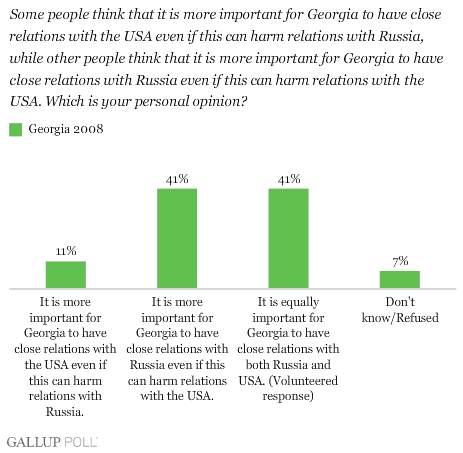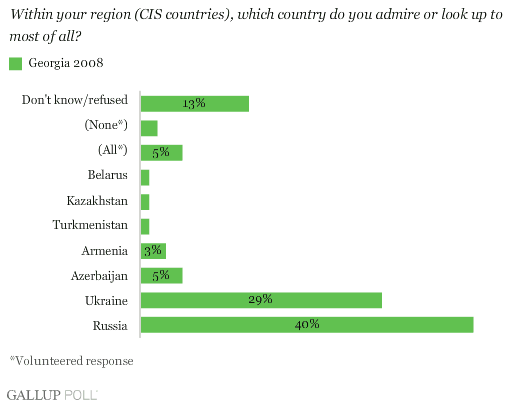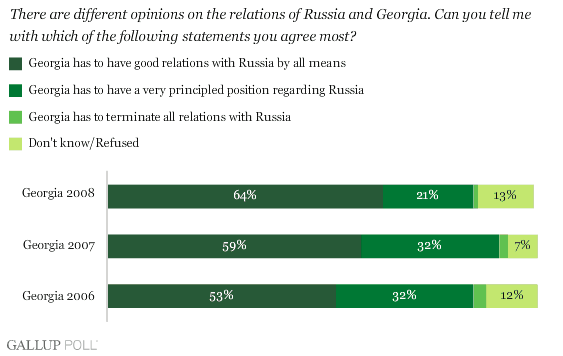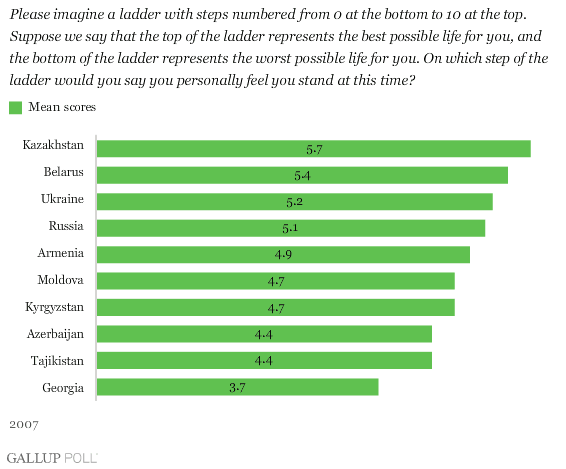WASHINGTON, D.C. -- With so many different opinions among the world's press as to the circumstances of the recent events between Georgia and Russia, it is easy to get caught up in the media's buzz as to who is at fault. But what is clear from Gallup Poll surveys is that many Georgians value the opposite political ties as those Western-minded Georgian President Mikheil Saakashvili desires. Specifically, 41% of Georgians surveyed before the recent conflict between the two countries find their country's relationship with Russia to be more important than their relationship with the United States.

When asked about the importance of relations between Georgia and Russia versus Georgia and the United States, nearly four times as many Georgians say that it is important to have good relations with Russia even if it hurts relations with the United States. Only 11% of Georgians responded yes to the statement "It is more important for Georgia to have a close relationship with the USA even if it might hurt relationships with Russia." However, 41% of residents volunteer that it is important to maintain relations with both countries. Ironically, Georgian leadership has sought the opposite of the people's wishes during Saakashvili's presidency, putting ties with the United States above relations with Russia. A Gallup interview with a leading Georgian economist and former presidential candidate Gia Maisashvili provides a possible window into Saakashvili's motives: "I think there's nostalgia for the Soviet Union times -- that we had security and we had the safety net, strong safety net. And then [when] people don't have that safety net, they automatically think Russia is the same as Soviet Union."
The Gallup Polls support Maisashvili's explanation. Only 9% of the poorest 20% of Georgians say it is necessary to maintain a close relationship with the United States, compared with 21% of the richest 20% of Georgians. If one assumes that the upper class experiences more security than the lower class, it would make sense for the latter to experience more "nostalgia for the Soviet Union times," even if both numbers are relatively low. But Maisashvili also notes the explanation could be more straightforward: "The U.S. is very distant culturally, and Georgians may subconsciously distance themselves from it." He also adds, "Many Georgians perceive Saakashvili as someone who is totally dependent on [the] U.S. administration. So when Saakashvili's image is discredited, the public reaction in Georgia is to discredit the U.S. as well."
It appears that what has been deemed the "2008 South Ossetian War" has pulled the people of Georgia into a conflict with Russia at a time when many see close relations with the country as important. In June, before Georgian troops entered South Ossetia, 40% of Georgians identified Russia as the country in the Commonwealth of Independent States (CIS) region that they admire or look up to most of all.

Maisashvili's explanation of nostalgia for Soviet times can also be identified in this question among the older demographics' tendency to foster greater admiration for Russia than that displayed by the youth. The combination of admiration for Russia and desire to maintain strong relations with its former compatriot shows that Georgians most likely would not have wanted the conflict between Georgia and Russia to escalate. When asked about relations between Russia and Georgia, over the past few years only about 1% of Georgians thought their country has to terminate all relations with Russia, whereas the percentage of citizens who say Georgia has to have good relations with Russia has increased.

Russia is the biggest market that Georgians have, and when their country's biggest market is closed, it affects the economy, and consequently, well-being, negatively. It is of no surprise then to find that according to Gallup's Well-Being Suffering Index, Georgia ranks among the countries with the highest Suffering Index scores out of 140 countries. Populations with high Suffering Index scores are more likely to be pessimistic about their current and future lives.
For example, when asked to rate their lives on a "ladder" scale with steps numbered from 0 to 10, where "0" indicates the worst possible life and "10" the best possible life, Georgia's score is the lowest (mean score of 3.7) among all CIS populations surveyed.

It remains to be seen how the 2008 South Ossetian War will change Georgians' views of Russia and the United States and their perceptions of the importance of maintaining relations with either country.
Survey Methods
Results are based on face-to-face interviews with at least 1,000 adults, aged 15 and older, conducted between 2006 and 2008. Gallup most recently polled in Russia in April-May 2008 and in Georgia in June 2008. For security reasons, Gallup did not poll in Abkhazia and South Ossetia. For results based on this sample, one can say with 95% confidence that the maximum margin of error attributable to sampling, weighting, and other random effects is ±3 percentage points. In addition to sampling error, question wording and practical difficulties in conducting surveys can introduce error or bias into the findings of public opinion polls.
